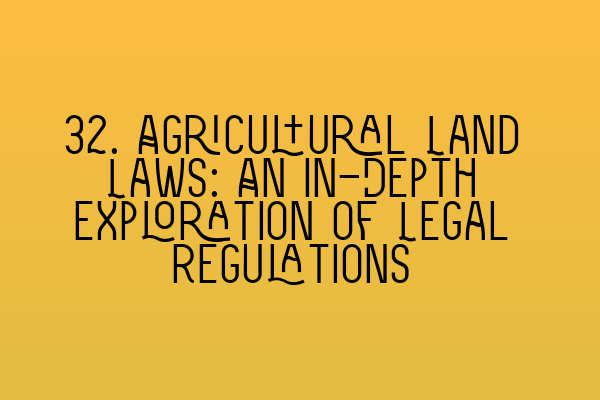32. Agricultural Land Laws: An In-Depth Exploration of Legal Regulations
Agricultural land plays a crucial role in supporting food production, preserving the environment, and promoting rural communities. In order to ensure the efficient use and development of agricultural land, comprehensive legal regulations are in place. Understanding these regulations is essential for any property law professional, as well as individuals and organizations involved in agricultural land transactions.
The Basics of Agricultural Land Laws
Before diving into the intricacies of agricultural land laws, it’s important to understand the basics. Agricultural land laws encompass a wide range of legal provisions that govern the ownership, use, and transfer of agricultural land. These laws vary from country to country, and even within regions or states.
In the United Kingdom, for example, agricultural land laws are primarily governed by the Agricultural Holdings Act 1986 and the Agricultural Tenancies Act 1995. These Acts set out the rights and responsibilities of agricultural tenants, landlords, and landowners. Additionally, there are specific regulations in place to protect agricultural tenancies, such as the Agricultural Holdings (Amendment) Act 2013.
Agricultural land laws cover various aspects, including:
- Acquisition and disposal of agricultural land
- Agricultural tenancies and agreements
- Planning and development permissions
- Environmental regulations
- Protection of agricultural activity
Agricultural Land Acquisitions and Disposals
When it comes to acquiring or disposing of agricultural land, there are specific legal requirements that must be followed. The process includes conducting searches, obtaining planning permissions, and considering any associated tax implications.
It is essential to engage a solicitor with expertise in agricultural land laws to guide you through the complexities of the process. They will ensure that all necessary legal documentation is in place and that the transaction is conducted in accordance with the applicable regulations.
If you are preparing for the SQE 1 exam and would like to practice your knowledge of property law, we recommend checking out our SQE 1 Practice Exam Questions. It will help you test your understanding of agricultural land laws and other property law topics.
Agricultural Tenancies and Agreements
Agricultural tenancies are crucial for the stability and sustainability of the farming community. The Agricultural Holdings Act 1986 and the Agricultural Tenancies Act 1995 provide the legal framework for agricultural tenancies in the UK.
These acts outline the rights and responsibilities of agricultural landlords and tenants, including matters such as rent reviews, succession, and compensation for improvements. It is vital for both landlords and tenants to understand their rights and obligations under these acts to ensure a fair and mutually beneficial agreement.
If you want to further enhance your understanding of agricultural tenancies and agreements, our SQE 2 Preparation Courses will provide you with comprehensive study materials and exam-style questions to test your knowledge.
Planning and Development Permissions
When it comes to developing agricultural land for non-agricultural purposes, obtaining planning permission is essential. The planning permission process involves submitting an application to the relevant local planning authority (LPA).
The LPA will consider various factors, such as the impact on the local environment, the need for the development, and any objections from local residents. It is crucial to carefully assess the legal restrictions and requirements surrounding planning permissions for agricultural land to ensure compliance.
If you are interested in practicing mock exams for the SQE 1 or SQE 2 exam, take a look at our SQE 1 Practice Mocks FLK1 FLK2 to enhance your exam-preparation strategies.
Environmental Regulations for Agricultural Land
As agricultural land has significant environmental implications, there are various environmental regulations in place. These regulations aim to protect biodiversity, prevent pollution, and promote sustainable agricultural practices.
It is essential for anyone involved in agricultural land transactions to be aware of and comply with these environmental regulations. Failure to do so can result in fines, legal disputes, and damage to the environment.
If you are preparing for the SQE 1 or SQE 2 exams and are looking for comprehensive preparation courses, we offer SQE 1 Preparation Courses tailored to your needs.
Protection of Agricultural Activity
Recognizing the importance of agricultural activity, legal regulations are in place to protect farmers and ensure the continuity of food production. These regulations provide safeguards against unfair eviction, unreasonable rent increases, and loss of agricultural land for non-agricultural purposes.
It is crucial for property law professionals to be familiar with these protective measures and to provide farmers with the necessary legal advice to safeguard their interests.
Conclusion
Agricultural land laws are complex and multifaceted, reflecting the importance of agriculture in society. Understanding these laws is crucial for property law professionals and anyone involved in agricultural land transactions.
If you are looking for reliable and comprehensive preparation for the SQE exams, we offer a range of preparation courses to suit your needs. Check out our courses for SQE 1 and SQE 2 to ensure you’re fully prepared for the exams.
For more information about the SQE exam dates and other important details, visit our article on SRA SQE Exam Dates.
